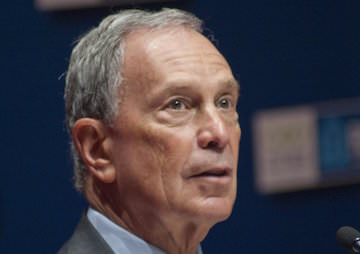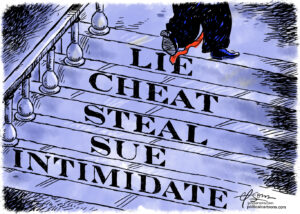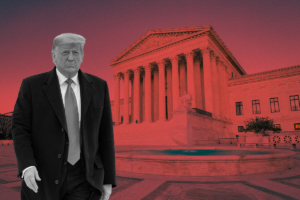Michael Bloomberg Keeps White House Run at Arm’s Length as He Eyes Donald Trump With Dismay
After Joe Biden's close call last fall, the latest subject of will-he-or-won't-he scrutiny in this chaotic election cycle is former New York City Mayor Michael Bloomberg So will he?. A. Einsiedler / Shutterstock
A. Einsiedler / Shutterstock
After Joe Biden’s close call last fall, the latest subject of will-he-or-won’t-he scrutiny in this chaotic election cycle is former New York City Mayor Michael Bloomberg. So … will he?
Short answer: Bloomberg still hasn’t definitively declared whether or not he’ll run for president, but it’s apparently not likely at this point. (Note: As with everything else this campaign season, that’s subject to change.)
As New York magazine’s Gabriel Sherman elaborated on Thursday, several variables are in the mix for the other New York-based billionaire with possible White House aspirations:
Though many have dismissed the prospect of a Bloomberg run as pure fantasy due to the challenging electoral math, a source close to Bloomberg says their research shows he would have a good chance in a Trump versus Sanders race, easily passing the 270 electoral vote mark by winning in New York, New Jersey, Connecticut, Pennsylvania, Ohio, Illinois, Florida, Maryland, California, Georgia, Virginia, North Carolina and Texas. “We’re spending all day thinking and talking about it,” said a member of Bloomberg’s team, who like most of the three-dozen people interviewed for this article would only speak without attribution.
And yet … Hillary Clinton’s post–New Hampshire recovery and crushing Super Tuesday victory has tempered Bloomberg’s lust for the highest office in the land. He’s told friends he does not want to challenge Clinton directly. “He doesn’t want to be Ralph Nader,” a close friend says. Bloomberg and Clinton have maintained a respectful relationship over the years. In fact, in 2012, Bloomberg lobbied her to run for mayor as his successor. At the very least, he is comforted by the fact that the Democratic nominee likely won’t be an avowed socialist.
And so, according to his advisers, Bloomberg is leaning against a run, and may announce that decision soon, but by putting his name out there, he’s joined Joe Biden as a possible backup plan for center and center-left voters terrified by the prospect of a Trump presidency. In the case of a Black Swan event like, say, a Clinton indictment—Trump is already making the case that she “shouldn’t be allowed to run”—Bloomberg could still, potentially, step in. His allies are pushing him as a more viable alternative than Biden or John Kerry in that scenario. “If Bloomberg stepped in, both those guys wouldn’t run against him,” says a friend. It may seem an unlikely turn of events, but this has already proved to be the kind of election where the normal expectations don’t apply. We’ve all become electoral doomsday preppers, with Bloomberg seeing an opportunity to lead us out of the bunker once the smoke clears.
Like most of the professional political class, Bloomberg and his advisers at first dismissed Trump’s candidacy as little more than a stunt. “When Donald Trump announced in June, I did not think he would have the rise and staying power he’s had,” says Doug Schoen. As mayor and a fellow plutocrat, Bloomberg had a cordial, if distant, relationship with the real-estate mogul turned reality-TV star. The two have played in the same golf tournaments, and in 2011, the Bloomberg administration made a deal with Trump to build a $10 million clubhouse and operate a public golf course in the Bronx. “There was no history of animosity,” a former senior City Hall official says.
Bloomberg’s view of Trump darkened as his immigrant-bashing campaign gained steam. “What galled him the most was his divisive rhetoric,” an adviser says. Another Bloomberg associate puts it more harshly: “Michael thinks Trump is a bloviating, bald-faced liar who can’t be trusted on any deals. He’ll tell you dozens of stories about Trump saying things he knows are patently false. Like, how he built the Grand Hyatt in midtown, or donations he’s made, or claims he’s made about friends he lost on 9/11. Michael says those are patently untrue.”
Throughout the fall, Bloomberg received a flurry of panicked calls from friends along the Acela Corridor imploring him to do something to stop Trump. Daily News owner Mort Zuckerman, J.P. Morgan CEO Jamie Dimon, Tishman Speyer chairman Jerry Speyer, and activist investor Bill Ackman all encouraged him to run. Not to mention Rupert Murdoch. “This is Bloomberg’s last chance,” Murdoch tweeted a few days before the Iowa caucuses. “You never know until your hat is in the ring! Events change everything, especially during elections. Nomination.”
Given Bloomberg’s alarm at the prospect of a President Trump, one would think he might, say, rely on his extensive media empire to help stem the pro-Trump tide — but then one would be wrong. Sherman’s story included a mention of how, after Trump blasted Bloomberg Politics for the network’s less-than-flattering coverage of him last spring, Bloomberg “issued an edict to ensure opinion journalists at Bloomberg View didn’t write columns that included personal attacks on Trump.”
Not that Bloomberg would be the great panacea for the nation’s political ills. His Wall Street loyalties, hawkish diplomatic sensibilities and problematic mayoral record on race and income inequality, among other factors, seem to mark him as a less-extreme conservative hybrid, hardly a centrist. But some voters who may be resigned to settle for the lesser evil still might welcome a third option.
–Posted by Kasia Anderson
Your support matters…Independent journalism is under threat and overshadowed by heavily funded mainstream media.
You can help level the playing field. Become a member.
Your tax-deductible contribution keeps us digging beneath the headlines to give you thought-provoking, investigative reporting and analysis that unearths what's really happening- without compromise.
Give today to support our courageous, independent journalists.






You need to be a supporter to comment.
There are currently no responses to this article.
Be the first to respond.